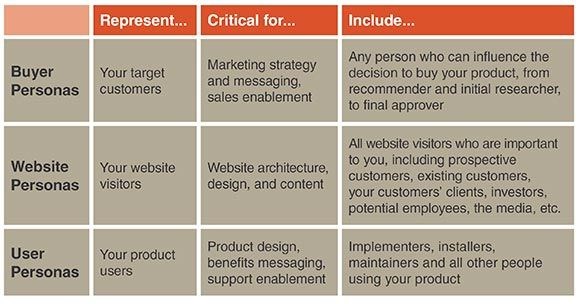The 3 Main Types of Personas and Why They’re Important
The reality of marketing is that most people only care about you in the context of their needs. So as marketers and advertisers, we must take the time to understand what our audience wants to hear, not what we want to say. Don’t assume what you want to say is what everyone wants to hear. An important first step to this is creating ‘personas’ of our potential audience.

By Natalia Klishina
Faction Media
One of the biggest mistakes marketing and advertising copywriters make is the same mistake any writer is prone to:
Assuming What You Want to Say is What Everyone Wants to Hear
It may sound harsh, but the reality of marketing is that most people only care about you in the context of their needs. So as marketers and advertisers, we must take the time to understand what our audience wants to hear, not what we want to say. An important first step to this is creating ‘personas’ of our potential audience.
What Are Personas?
Personas are similar to archetypes in that they are fictional representations of a larger whole, but they are slightly less symbolic and much more detailed. Personas are essentially invented people that represent the different mindsets, motivations, and behavior patterns of all your various audience segments.
Developed through research, data, interviews, and educated speculation, personas are meant to guide the decisions you make about designing and marketing your products or services. They are an excellent point of reference when you’re writing marketing materials or re-designing a website and you notice yourself veering away from your original goals, singing your own praises too much, or bickering about the details. Just go back to your agreed-upon set of personas and say, “Ok, let’s put aside what we think for a second, and consider what they would say about this.”
The 3 Main Types of Personas
Most people, when they think of personas, probably think of buyer personas. However, we’ve developed at least three major types of personas for our clients:
1. Buyer personas represent your target customers. These are the people involved in the decision to purchase your products or services. They usually have the clearest link to revenue and thus play the biggest role in driving marketing strategy and messaging.
2. Website personas represent all the people that your website is meant to serve. They are critical in guiding website design and include important audiences that buyer personas don’t account for (e.g., existing customers, your customers’ clients, investors, potential employees, the media, and more) as well as crucial behavioral considerations that guide user experiences.
3. User personas represent the individuals who will be using your product, regardless of whether they have any influence over the purchasing decision. These personas may be used to guide product design, as well as messaging about product benefits — and they are often different from buyer personas. For example: whereas a CIO might make a decision to buy certain software, IT teams will be managing it, and regular employees will be using it.

Start a Meaningful Conversation
Think of marketing as party conversation. When you meet a stranger, do you immediately make assumptions about their lifestyle, professional goals and behaviors? Or do you (we hope) ask some questions first? By taking the time to learn more about someone, you naturally create more meaningful conversation. Personas give marketers the opportunity to get to know their audience — and understand what they really want to hear.
Need more information?
Natalia Klishina
Faction Media
1730 Blake Street
Suite 200
Denver, CO 80202
303-339-0206
www.factionmedia.com


